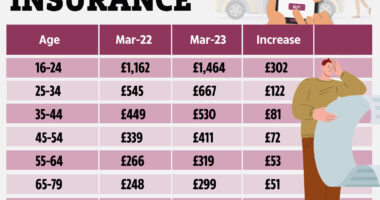MILLIONS of households can cut back on energy bills by switching up what appliances they use.
Families’ average annual household bills are due to hit £2,500 from next month, when the new Energy Price Guarantee comes into effect.
It means people will be looking for ways to cut back on their outgoings as the cost of living bites.
Of course, it’s important to remember £2,500 isn’t the maximum you’ll pay but what the average household will pay.
You may pay more or less depending on your energy usage as the Price Guarantee only limits the price charged per unit of energy and your daily standing charge.
We revealed the most energy-guzzling appliances around the home, but what do you do if you want a more energy efficient alternative?


The Sun spoke to Gareth Kloet, energy expert at price comparison site Go Compare, who gave his suggestions on ways to swap appliances to save money.
It’s worth noting, out of our list of energy-guzzlers, it’s not always possible to make a switch.
For example, there’s not really a decent alternative to a shower.
To reduce your bills you can stay in the shower for less time, or colder water, but there’s not a straight switch.
Gareth also shared his tips for reducing your spend where you can’t make a switch.
Most read in Money
Hob for microwave
According to Uswitch, the cost of using a hob from October 1 will set the average household back £163, up from £80 under the current price cap.
But one alternative to using the hob is a microwave, Gareth suggested.
“Microwave heating is typically more energy efficient than the prolonged use of a cooker,” he said.
Of course, it’s not always viable to cook in a microwave and sometimes you might be willing to spend more cooking a meal on the hob that tastes better in comparison.
Kettle for hob
Uswitch said a kettle will cost £98 to run from October 1, so finding a different way of boiling your water could save you some pounds.
Gareth said boiling your water in a pan on a gas hob is one such way.
“Water boiled on a gas hob is cheaper than boiling it in a kettle, however it is significantly less convenient,” he said.
And adding a lid to your pan will stop excess heat from escaping and use less energy as well.
The Sun’s consumer reporter Harriet Cooke put the energy-saving theory to the test after seeing if it was cheaper for her to boil water on the hob – and found it was easier than expected.
If you don’t want to make the switch to your hob, you can always reduce the amount your kettle is working by only boiling the amount of water you need.
Tumble dryer for heated air dryer
Not everyone has one, but if you do, tumble dryers can churn through energy as it’s one of the most gas-guzzling appliances.
They cost an average of £72 a year to run under the current price cap which will go up to £92 from October 1 as well.
Gareth suggested using a heated clothes airer or simply hanging your washing out on the radiator and the rest of the house.
He said: “If you can reduce the amount you tumble dry as well, you’ll be spending less.
“And if you try to dry all your cottons together that would be more efficient than adding in jumpers as well.
“For jumper and knitted wear, let it drip dry.”
You can grab a heated clothes airer for as cheap as £29.99. For a list of some of the best on offer this year, you can read our guide.
They will cost 16p to run for an hour under the new Energy Price Guarantee. So if you had one on for eight hours a week for example, it would cost you £1.28.
Over the course of the year that would set you back £66.
If you still want to use your tumble dryer, one savvy saver previously revealed how putting a dry towel inside your unit will make your clothes dry faster.
Another way you can save on your tumble dryer costs is by doing an extra 10-minute spin in the washing machine first to get it drier beforehand.
Plug-in electric heater for central heating
Plug-in electric heaters might seem ideal as they can fire a jet of warm air directly at you.
But according to Uswitch, from October 1 it will set the average household back £64 a year. That’s based on 1.7 hours of use a week.
If you upped that to 10 hours a week, you’d be spending £376 a year – and it only heats one room and for just over an hour a day.
Instead, Gareth said, stick to central heating, but “localise” it, and only heat up the rooms you are in.
He said: “For things for central heating you can’t compare heating your entire home to an electric heater.
“But like for like, gas is cheaper to burn than electric.
“If you’ve got a six-room house, to heat the whole thing you’d have to put six electric heaters in each room, and that is significantly less efficient than central heating.
“Using a single electric heater to heat a single room is quite efficient, but not compared to gas on a like-for-like basis.”
However, he added, if you are turning off heating in certain rooms, don’t switch it off in there completely if you can avoid it otherwise you may suffer from burst pipes.
You can do this with thermostatic radiator valves, which have settings between one to five that you can adjust to a lower or higher temperature.
It means you don’t have to completely turn off your heating in each room.
“Only heat the rooms you’re in,” Gareth said. “But don’t turn everything off completely.”
“If you can afford to turn down your heating, that will obviously save money,” he added.
Turning your thermostat down by just one degree could save your 10% on your annual energy bills as well.
Gareth added: “Dressing appropriately for the weather will save you money as well.”
Martin Lewis’ moneysavingexpert.com has previously advised households to “heat the human and not the home”.
That means wrapping up in warmer clothes before turning your heating on.
What other help is there for energy bills?
Besides switching up those energy-guzzling appliances, there are other ways you can get help with your energy bills.
Energy suppliers offer cash grants to vulnerable households hit by bill rises.
British Gas recently confirmed it will pay its most vulnerable customers grants up to £750 to help with rising bills.
You can always ask your supplier for help as well.
Millions of eligible households should have received the first instalment of their £650 cost of living payments already worth £326.
The next instalment of £324 will be paid in the winter, although the government is yet to confirm a specific date.
There’s the energy bill rebate scheme as well, that will see millions of households given a £400 discount across October to next March.
Some pensioners will receive a £300 cost of living payment as well, and millions of people on disability benefits were handed £150 earlier this week.


On top of this, payments for the warm home discount scheme should start from December.
You won’t need to apply for the scheme if you’re eligible though and will receive a letter in the post around October confirming your eligibility.









